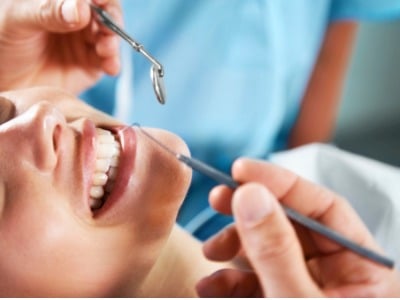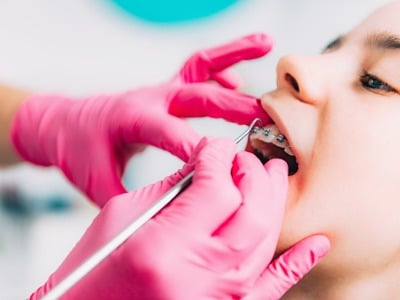
Don’t Be Afraid to Speak Up – There is Nothing to Fear Here!
First, it is important to note that your dentist is not trying to be scary. They have no intentions to cause you any pain or discomfort. Their goal is to keep you and your teeth happy and healthy! Dentists also have to go through many years of schooling before they are allowed to practice dentistry. Thus, they are extremely qualified experts in their field. Additionally, your dentist doesn’t want your visit to be a traumatic or anxiety-inducing experience. If you simply communicate your feelings to them, they will do whatever they can to help make your visit better.
 These sores are small ulcers that can pop up in your mouth and on the inside of your lips and take days to heal. While they are not serious, they can be pesky and annoying. If you can find out what causes them, they can be easier to prevent! Keep reading for some advice from
These sores are small ulcers that can pop up in your mouth and on the inside of your lips and take days to heal. While they are not serious, they can be pesky and annoying. If you can find out what causes them, they can be easier to prevent! Keep reading for some advice from  A very normal and common part of orthodontic treatment is the use of elastics, which are also known as rubber bands. These devices are crucial to helping teeth to move into the proper position. Wearing them as instructed is a crucial part of making sure your treatment is completed correctly and in a timely manner. The elastics are supposed to be worn approximately 20-22 hours a day and should only be removed to eat and then to brush and floss their teeth. Additionally, elastics should be changed out for new ones about three times a day. Keep reading for some advice from
A very normal and common part of orthodontic treatment is the use of elastics, which are also known as rubber bands. These devices are crucial to helping teeth to move into the proper position. Wearing them as instructed is a crucial part of making sure your treatment is completed correctly and in a timely manner. The elastics are supposed to be worn approximately 20-22 hours a day and should only be removed to eat and then to brush and floss their teeth. Additionally, elastics should be changed out for new ones about three times a day. Keep reading for some advice from  The health of your body is very crucial to your well being and quality of life. Your teeth and mouth are a part of that too! It is important that your teeth and mouth are well nourished and taken care of to keep your smile healthy and shining bright. Luckily, there are many easy ways to help prioritize the health of your mouth and teeth with minimal effort. Here are some tips for keeping the beautiful and healthy smile you deserve from
The health of your body is very crucial to your well being and quality of life. Your teeth and mouth are a part of that too! It is important that your teeth and mouth are well nourished and taken care of to keep your smile healthy and shining bright. Luckily, there are many easy ways to help prioritize the health of your mouth and teeth with minimal effort. Here are some tips for keeping the beautiful and healthy smile you deserve from  What is tooth contouring and reshaping? Teeth reshaping is one of the most convenient and cost-effective options for fixing chipped, uneven, or poorly aligned teeth to create a more attractive smile. Dentists may combine shaping or contouring teeth with a treatment called bonding. Bonding involves applying resin to improve the overall appearance of the teeth. The best teeth to perform this kind of procedure on are typically the front teeth. For more advice about tooth contouring and reshaping from
What is tooth contouring and reshaping? Teeth reshaping is one of the most convenient and cost-effective options for fixing chipped, uneven, or poorly aligned teeth to create a more attractive smile. Dentists may combine shaping or contouring teeth with a treatment called bonding. Bonding involves applying resin to improve the overall appearance of the teeth. The best teeth to perform this kind of procedure on are typically the front teeth. For more advice about tooth contouring and reshaping from Experiencing a little soreness after your braces have been tightened is not uncommon. While each person’s mouth is different, fortunately, most only feel a mild, achy pressure that will subside within a day or two. Moreover, as you are in braces longer, the quicker your discomfort will resolve itself after each tightening. No need to fret though, there are several things that you can do to help if your mouth is feeling at all sore. Here is some advice from
Experiencing a little soreness after your braces have been tightened is not uncommon. While each person’s mouth is different, fortunately, most only feel a mild, achy pressure that will subside within a day or two. Moreover, as you are in braces longer, the quicker your discomfort will resolve itself after each tightening. No need to fret though, there are several things that you can do to help if your mouth is feeling at all sore. Here is some advice from